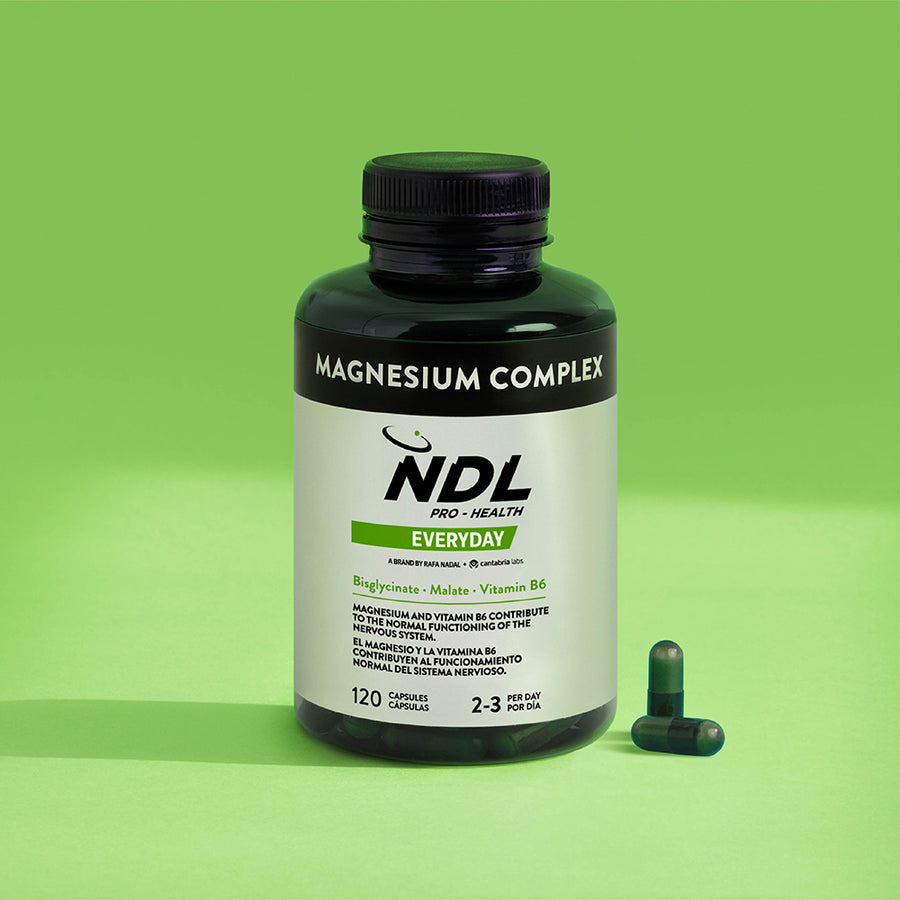Featured Products

Triple Magnesium
See productMagnesium is a vital mineral involved in multiple key functions in the male body, from physical performance to emotional balance. However, its importance is often overlooked, and deficiency can lead to fatigue, cramps, and hormonal imbalances.
In this article, we’ll explore how magnesium supports your daily wellbeing. We’ll cover its main benefits for men, the most effective natural sources, and when to consider taking a supplement. Discover why this mineral should be part of your daily routine!
What is magnesium and why is it important?
Magnesium is an essential mineral that plays a crucial role in numerous functions in the human body. It is present in every cell and is involved in more than 300 biochemical reactions that regulate vital processes like energy production, muscle and nerve function, protein synthesis, and maintaining healthy bone structure.
Main benefits of magnesium in men
- Improves physical performance and muscle recovery: magnesium helps relax muscles after exercise, prevents cramps, and reduces fatigue. It also supports energy production, improving performance during intense workouts.
- Supports cardiovascular health: this mineral helps regulate blood pressure, keeps the heartbeat steady, and helps prevent cardiovascular diseases by lowering the risk of hypertension.
- Balances testosterone levels: magnesium plays a key role in the synthesis of testosterone, the main male hormone. Adequate testosterone levels are essential for sexual health, muscle development, and maintaining bone density.
- Reduces stress and anxiety: by regulating the nervous system, magnesium helps lower cortisol (the stress hormone) and improves the body’s response to pressure.
- Improves sleep quality: magnesium acts as a natural relaxant, helping you fall asleep faster and enjoy deeper, more restorative rest.
- Strengthens bones and prevents osteoporosis: along with calcium and vitamin D, magnesium helps maintain strong bones, reducing the risk of fractures and conditions like osteoporosis.
- Supports energy metabolism: magnesium helps convert food into energy, combating chronic fatigue and maintaining vitality throughout the day.
- Regulates blood sugar levels: it helps improve insulin sensitivity, reducing the risk of type 2 diabetes and aiding in glucose control.
Including an adequate amount of magnesium in your daily diet is essential to enjoy all these benefits. So how can you do that?

Natural sources of magnesium for men
Fortunately, there are many natural sources rich in magnesium that can help men maintain optimal levels of this nutrient. Here are some of the best options:
-Nuts and seeds: almonds, cashews, Brazil nuts, pumpkin seeds, chia seeds, flaxseeds.
-Dark leafy greens: spinach, Swiss chard, kale, broccoli.
-Whole grains: oats, brown rice, quinoa, whole wheat.
-Legumes: lentils, chickpeas, black beans, peas.
-Fatty fish and seafood: salmon, mackerel, tuna, sardines.
-Fruits: bananas, avocados, dried figs.
-Dark chocolate: at least 70% cocoa.
-Dairy: plain yogurt, fresh cheese.
-Magnesium-rich mineral water.

Incorporating these natural sources into your diet not only helps maintain proper magnesium levels but also supports overall health.
How much magnesium do men need?
The recommended daily amount of magnesium for men varies depending on age and life stage. General guidelines from international health institutions include:
-Men aged 19 to 30: 400 mg per day.
-Men over 31: 420 mg per day.
Additionally, some factors may require men to increase their magnesium intake, such as:
- Regular intense physical activity: sweating leads to magnesium loss, so athletes or very active people may need more magnesium daily.
- Chronic stress: stress increases magnesium demand in the body.
- High intake of caffeine and alcohol: both can interfere with magnesium absorption and retention.
- Chronic diseases: type 2 diabetes, digestive disorders (like Crohn’s disease), or kidney issues can affect magnesium levels.
- Use of certain medications: diuretics, antibiotics, and some blood pressure medications can lower magnesium levels.
The best way to get magnesium is through a balanced, varied diet rich in magnesium-containing foods.
When and how to take magnesium supplements?
Taking magnesium supplements can be a great option when the recommended daily intake isn’t met through diet. However, it’s important to know when and how to take them to maximize benefits and avoid side effects.
When to take magnesium supplements?
- At night (before bed): has a calming effect and can improve sleep quality and reduce insomnia. Ideal for better rest and less stress.
- After intense physical activity: helps relax muscles and prevent cramps, aiding muscle recovery and reducing fatigue.
- During periods of high stress or anxiety: helps balance the nervous system and lower cortisol levels. Can be taken with a light meal for better absorption.
- With meals during the day: if you have deficiency symptoms (cramps, fatigue, headaches), taking it with food reduces the risk of digestive discomfort.
Avoid taking magnesium with other mineral supplements (like calcium or zinc) at the same time, as they may compete for absorption.
How to take magnesium supplements?
Choose the right form:
- Magnesium citrate: easily absorbed, ideal for constipation and muscle relaxation.
- Magnesium glycinate: highly absorbable, recommended for insomnia and anxiety.
- Magnesium chloride: great for digestion and quick absorption.
- Magnesium oxide: lower absorption, but useful for digestive issues.
Recommended dose: do not exceed 350 mg per day from supplements (excluding food sources). Always follow manufacturer instructions or health professional guidance.
Combine with vitamins B6 and D: these improve magnesium absorption and utilization in the body.
Avoid with caffeine or alcohol: both interfere with proper magnesium absorption.
Drink enough water: water helps absorption and reduces potential digestive side effects.
So, always prioritize natural sources of magnesium and only use supplements when needed or recommended by a doctor.
In conclusion, ensuring adequate magnesium intake through a balanced diet or supplements when necessary is key to a healthier, more active life. Add magnesium to your daily routine and boost your health!

From the NDL Pro-Health team we will provide you with tips to maintain a healthy lifestyle. Sharing knowledge and product recommendations to offer optimal solutions for your daily routine, for your workouts and subsequent recovery, all with the goal of helping you achieve physical and mental wellness.

















